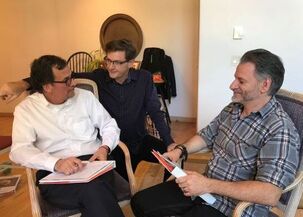Blog Blog Blog...
for RIM Facilitators, Coaches, Trainers, Retreat Leaders and Evolving Humans in General
 By Michael J. Kline This is usually a gift I wish I could return or exchange for store credit. Most of us can accept compliments, (even if we swallow it with a little doubt or self-criticism). Some of us can accept suggestions. One or two of us can bend our minds around a completely new idea. But when it comes to criticism, that’s where most of us shut the door and hang up the “closed” sign. After all, who wants to hear the sentences that begin with, “You want to know what your problem is?” or “If only you would just change (fill in the blank) about yourself”? Maybe your coach friends soften it with something like” would you be open to a little feedback?” Few people learn how to accept (or give) criticism gracefully as they are growing up. Many may have been criticized harshly or told things for their “own good” that were hurtful rather than helpful. We learn to dread anything that seems judgmental or critical. Criticism is just another form of feedback. And everything is feedback. If we can learn to truly listen to the feedback about ourselves, we open the door to possibility. Learning to accept and use feedback can be one of the most constructive and profound tools to change ourselves and improve our relationships with others. Not only can we learn more about who we are and how others see us, but we may also learn that it’s okay not to be perfect. And, as a bonus, we may learn that people will love us anyway, warts and all. If you’re like me, you might already be saying “easier said than done” and you’re right. Feedback as Opportunity Bernie Siegel, author and physician writes that criticism is an opportunity to become a better person. “When you feel inadequate or imperfect, criticism is threatening and makes you feel that you have to defend yourself. When you are secure—not perfect, but secure—you can listen to the criticism and consider its value.” Byron Katie, author of Loving What Is, calls criticism “a powerful tool for self-realization and growth.” She suggests that when we are criticized for being wrong, unkind, uncaring, etc., we should ask ourselves if the criticism is true. If we can accept the truth without stress or pain, we free ourselves from trying to hide who we are from others. We know our faults and we accept them and, therefore, criticism from others cannot hurt us. “When you are genuinely humble, there is no place for criticism to stick,” she writes. Sound good, but in real life, it’s too much? Feel free to jump to the bottom of this article, if you’re over it! Learning from Our Children Parents are often among the most criticized group of people. Their parenting choices are targeted by relatives, other parents, strangers and parenting “experts.” And when their children are old enough to speak, they join in the chorus! But of all the voices, it may be our children who offer us the most valuable feedback because they see us at our most vulnerable and unguarded. Children—especially teens—will tell us exactly what they think, in unadorned, sometimes painfully honest, language. If we are able as parents to drop our authority roles and our belief that we know better because we are older/wiser/better, we can learn some awe-inspiring truths about ourselves. (And yes, it will hurt at times!) By doing this, we also model the art of accepting criticism—a valuable skill for our children as they grow up. Questions to Ask Yourself Don Powell, Ph.D, of the American Institute for Preventive Medicine writes that sometimes criticism—the right kind of criticism—is just what we need to make important changes. In an AIPM handbook, Dr. Powell outlines the following questions to ask yourself when working with criticism:
Once you decide that there is some truth to the feedback, you are on the path to taking positive steps to make changes in your behavior or outlook. Being able to hear and absorb criticism without anger or defensiveness helps make the path that much smoother. When the defensiveness feels too strong, or when you feel certain it’s not safe or warranted, then there is likely a deeper root cause. The issue isn’t so much the criticism, as it is the safety and confidence that would make it okay to receive. Sometimes, I’ve just felt too vulnerable to take anymore feedback. At the RIM Institute, we teach how to dip beneath logic, using body awareness and spontaneous imagination to dissolve the root cause of the issue. We find there is often a pain buried and forgotten that’s too deep for the thinking mind to talk it’s way out of how it feels. You’re not broken, you’re human and we all have these experiences. I’d be honored to help you dip beneath your logic to easily dissolve the root cause. We want you free and happy! Michael J. Kline is a Master Trainer, Retreat Leader and Firekeeper. You can often find him teaching emotional processing skills like RIM (Regenerating Images in Memory), training transformational trainers, or hosting a retreat at Con Smania in Costa Rica. Otherwise, he’s at home in Sarasota FL, with his husband of 34 years, and their labradoodle Luke. You can reach him through his website www.michaeljkline.com or e-mail mike@michaeljkline.com Author’s content used under license, © Claire Communications
0 Comments
Leave a Reply. |
Michael J. KlineMaster Trainer. Retreat Leader. Firekeeper. Archives
July 2023
Categories |